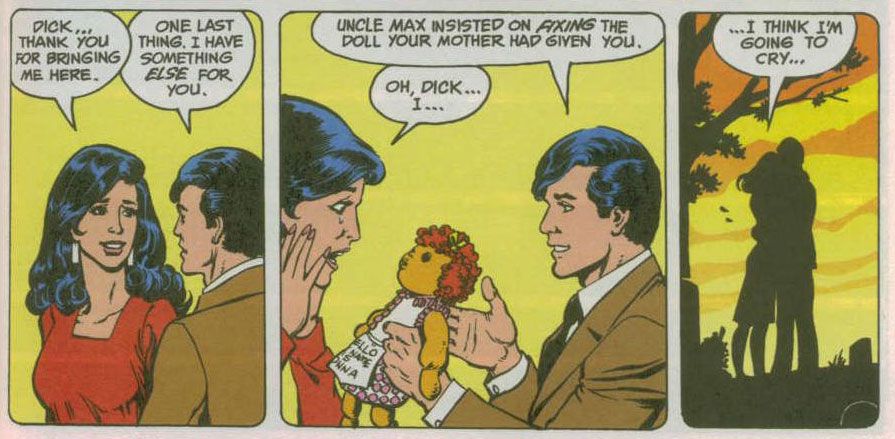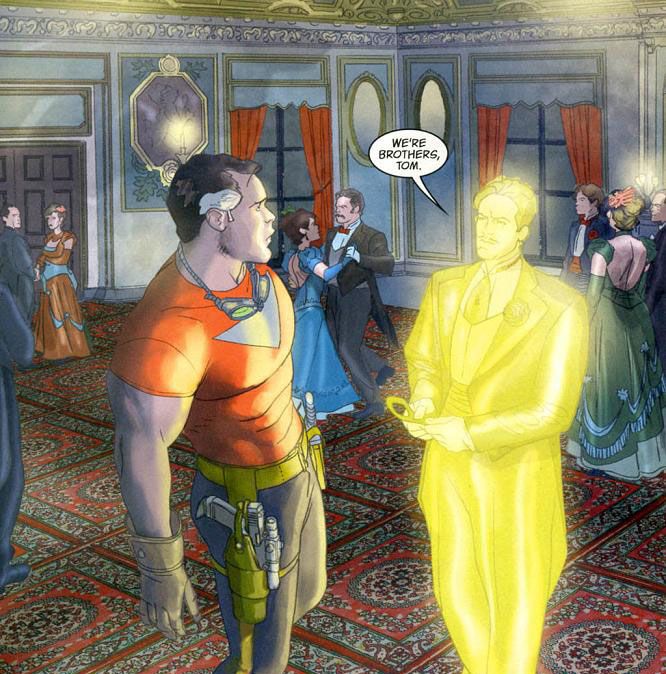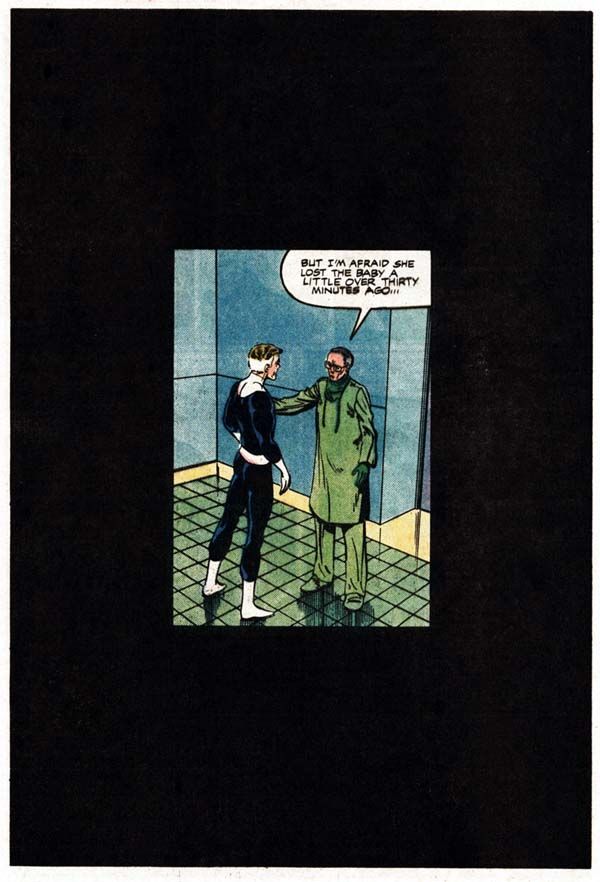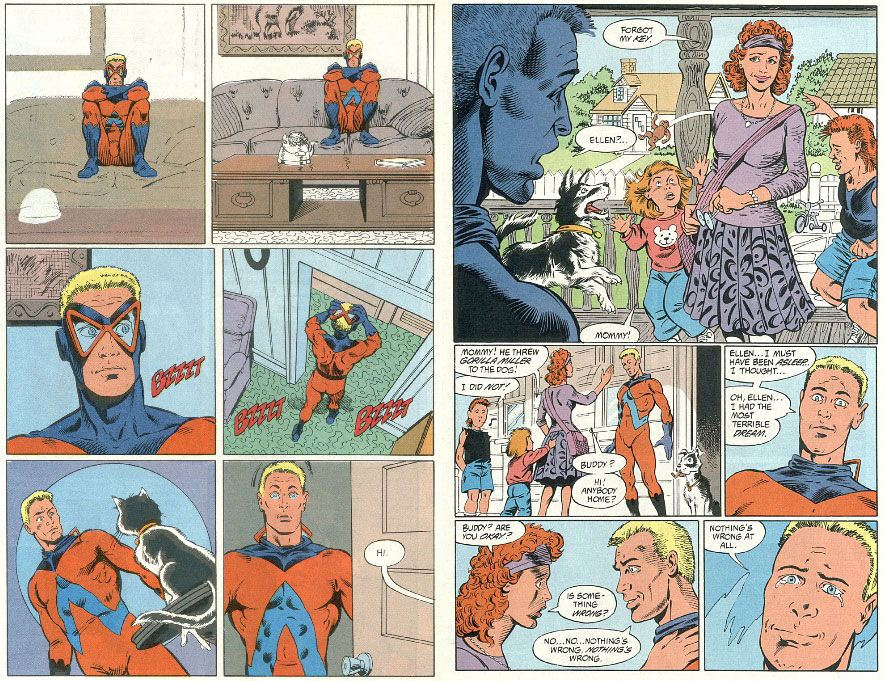This week Chris Mautner suggested we share our softer sides and each talk about three comics that broke down our tough-guy exteriors and made us openly weep as we turned the pages. It's a risky venture, to be sure; to some members of our audience, this will destroy the "manly man" image we've worked so hard to build up on the blog, but for others, it will show there's more to who we are than just bad jokes and Shelf Porn.
So here they are -- six comics that made us cry. After reading our selections, be sure to grab a tissue and tell us what comics made you cry as well.
1. "We're brothers, Tom"
I always thought Tom Strong was the weakest of Alan Moore's ABC line (in fact I said so rather openly in issue #231 of The Comics Journal). Oh sure, there were lots of colorful dialogue and zany plots, but I felt the series was sorely lacking in gravitas. The characters seemed too thinly sketched to me and I couldn't find myself forming enough of an emotional commitment to them to care about what happened to them. It kept hinting that there was a lot more going on under the surface, but that's all it would do, hint.
That was until the final issue, no. 36, where, during the "end of the world as we know it" created by Promethea, Tom is confronted by the ghost of his arch-enemy Paul Saveen, who reveals that he is, in fact, Tom's half-brother. What follows is one of the most tender scenes I've ever read in a superhero book ("Jesus Paul" Tom says, breaking down "We tried to kill each other.") When, two pages later, Tom introduces Saveen to a passerby with a simple "This is my brother. This is my brother Paul" well, I just lose it. --Chris Mautner
2. "...I think I'm going to cry ..."
Back in the 1980s, Marv Wolfman and George Perez had a pretty incredible run on the New Teen Titans, and issue #38 always stood out to me as one of the highlights -- and one that, yes, made me cry. "Who is Donna Troy?" was narrated by Dick Grayson as he attempted to track down information about his longtime friend Donna Troy, whose past was much less of a continuity nightmare back then. The structure of the story had Grayson using his detective skills to find clues about Donna's past, and we saw her emotional reaction as he presented each of them to her. Part of the mystery is resolved thanks to a doll Grayson finds in the apartment building where Wonder Woman first found Donna. He tracks it back to a toymaker who used to fix dolls for the orphanage where Donna lived for a time, which eventually leads to Donna reuniting with her adopted mother and visiting the grave of her real mom.
An emotional scene, sure, but it wasn't the one that got me ... it was when Grayson pulls out the doll again, fixed by the toymaker. It gets me every time:
--JK Parkin
3. "The Indifferent Winter"
Chris Ware's comics always get billed as "cold" and "unfeeling," which never makes sense to me, as I see him as one of the most heart-rendering cartoonists around. There's one strip, however, collected in Quimby the Mouse, that, upon first read, made me break down and reach for the tissue box. It's a silent strip, consisting of tiny, tiny panels, all of equal size, taking up an entire page (that's 13 across and 25 down if you need an accurate count). It's a simple tale involving the ever fickle Quimby and the bodyless cat head he hates. Tired of his presence, he sends the head off on an oceanic voyage, where the poor thing ends up encased in ice before being saved and eventually comforted by another mouse. Of course, by this point, Quimby is disconsolate at the loss of his friend/lover/whatever and sets off to find him. He does, but it's too late, the cat head is happy in his new relationship, so Quimby heads back home alone. Months pass and a package arrives for the head. It's the old victrola he and Quimby used to listen to and its appearance makes the head burst into copious tears of regret. I don't know why, but by that final panel I was doing the same thing. It didn't matter really what Ware did from that point forward. He had me. --Chris Mautner
4. "Yes, Doctor Octavius. You can help. You must help."
No, he couldn't -- or wouldn't, anyway. In Fantastic Four #267, a pregnant Sue Richards had radiation poisoning, and a host of the Marvel Universe's top scientist -- including her husband, Reed -- were trying to find a cure to save Sue and the baby. In a desperate moment, Reed turns to an incarcerated Doctor Otto Octavius, a.k.a. Doctor Octopus, and asks for his help.
While overall things weren't looking good for Sue and her baby, this issue started with a glimmer of hope, that maybe the Fantastic Four could find the help they needed from one of Spider-Man's worst enemies. At the time, Octavius was separated from his mechanical arms, and Reed manages to connect with him as a scientist, convincing him that he could still help people. Unfortunately, once Reed and Octavius are on their way to see Sue, old habits return, and Reed spends most of the issue wrapped in battle with the Octopus arms.
It's a pretty emotional issue all around, from Reed's desperation to save his family to the seeming redemption of Doctor Octopus. But it's the last page that really got me:
--JK Parkin
5. "Don't wiggle aroun' an get the covers off'n ya."
E.C. Segar's Popeye is, without a doubt, one of the funniest comic strips ever made (I'm pretty sure it says so in the Library of Congress somewhere) but that's only part of the reason it's one of the greatest comics ever made (again, LoC). Segar had drawn such indelible and compelling characters for so long that he could easily turn farce into heartfelt tragedy without nary a pause. That's exactly what he did in the Sept 26, 1937 Sunday strip, where the baby Swee'Pea's long lost mother returns to claim her child. Forced to turn him over, Popeye goes dead silent, staring at the door, then sits down on a stool, his hand on his chin. "Sweepea's gone," he says, matter of factly. The Jeep, his odd pet, gets a baby doll from the table and hands it to Popeye. Popeye puts it Swee'Pea's bed, tucks it in and then goes to bed himself, with a simple "G'Night." That, ladies in gentlemen, is the saddest comic I have ever read. God, I'm getting all verklempt just typing this. --Chris Mautner
6. "Nothing's wrong at all."
Grant Morrison's run on Animal Man is one of my favorites. From the story of Crafty in "The Coyote Gospel" to the animal rights issue featuring Dolphin to revisiting Psycho Pirate being the only one who remembered Crisis on Infinite Earths, the book covered a lot of interesting and varied themes. The one theme, though, that really resonated with me was the theme of family. Despite all the postmodern, "breaking the fourth wall" adventures that Animal Man found himself in, Buddy Baker was at heart a family man, and throughout the series I came to love reading about Ellen and the kids as much as I did about Mirror Master and B'wana Beast.
So when issue #19 hit, man ... it was an emotional punch to see Buddy's family die. But that's not the moment I remember that made me cry. It was when they came back in Animal Man #26:
In a classic issue that featured a conversation between Animal Man and his writer, the only person who really could save Buddy's family, Grant Morrison, does just that. Sniff. --JK Parkin




